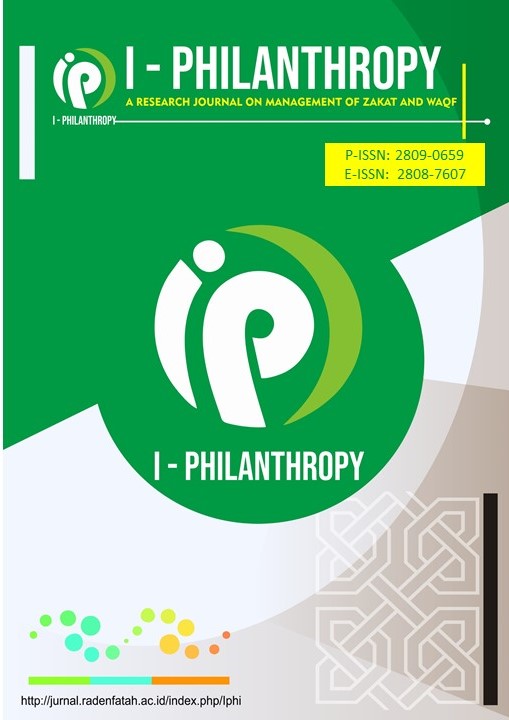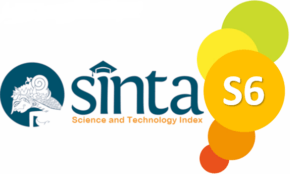The Influence of Income and Community Trust on the Decision to Donate Cash at the Ruhul Mukminin Mosque, Musi Rawas Regency
DOI:
https://doi.org/10.19109/iphi.v5i2.30391Keywords:
Endowment; Income; TrustAbstract
This research aims to analyze the influence of income and community trust on the decision to donate cash at the Ruhul Mukminin Mosque, Musi Rawas Regency.The method used in this research is a quantitative approach. The sample used was 85 respondents from a population of 561 people. The technique for using the sample was systematic purposive sampling. With primary data sources using the IBM SPSS Statistics 29 tool. The results of the research that has been conducted show (1) for the t-test results, the calculated t value > t table (3,622 > 1,990) means that income influences the decision to waqf money (2) for the t-test results, the calculated t value > t table (3,487 > 1,990) means that public trust influences the decision to waqf money (3) for the f-test results, the calculated f value > f table (22,087 > 3.11) means that simultaneously income and public trust influence the decision to waqf money. And the coefficient of determination (R Square) is 0.592, which means that income and public trust have an influence on the decision to waqf money of 52.9%.
References
Affif Putri, Adzraa Atiqah, and Darna. “Analysis of Factors Influencing Waqif Decisions in Waqf.” Proceedings of the National Seminar on Accounting and Management 03 (2023).
Amin, Irsyad Ali, and Faozan Amar. “Waqf Literacy, Income, and Digital Marketing on Waqf Decisions to Endow Cash.” Al-Urban: Journal of Islamic Economics and Is-lamic Philanthropy 6, no. 1 (2022): 100–110.
Indonesian Waqf Board. “National Waqf Index 2022,” nd
Bimo Putro Wicaksono, Laeli Budiarti, Umi Pratiwi. “The Influence of Transparency, Individual Trust in Waqf Institutions, and Knowledge of Waqf Regulations on Waqf Interest (Empirical Study on Waqf in Purwokerto).” Indonesian Journal of Islamic Business and Economics 02, no. 02 (2020): 67–82.
Ferdila, Merdiana, Dan Kasful, and Anwar Us. “Analysis of the Impact of Online Motor-cycle Taxi Transportation on Conventional Motorcycle Taxi Income in Jambi City.” IJIEB: Indonesian Journal of Islamic Economics and Business 6, no. 2 (2021): 2021.
Hidayat, Ali Akbar, Moh. Huzaini, and Ihsan Ro'is. “The Interest of Mataram City Resi-dents in Donating Cash, Moderated by Religiosity.” Global Education Journal 5, no. 1 (2024): 750–60. https://doi.org/10.55681/jige.v5i1.2512.
Husna, Imam Teguh Saptono Sarmidi, fahruroji, Tanjung Herdi. Questions and Answers on Cash Waqf and Cash Waqf Linked Sukuk. Indonesian Waqf Agency, and www.bwi.go.id.
Miranda, Lemiyana, and Citra Pertiwi. “The Influence of Work Ethic and Motivation on the Income of Female Traders at the Kebun Bunga Market in Palembang City.” Al-Iqtishod: Journal of Islamic Economics 6, no. 1 (2024): 11–26.
Nanda Anggih Pratiwi, and Multifiah. “Analysis of Variables Influencing the Decision to Make Cash Waqf.” Islamic Economics and Finance in Focus 2, no. 1 (2023): 13–22. https://doi.org/10.21776/ieff.2023.02.01.02.
Pamungkas, Ryan, and Bahtiar Fitianto. “Analysis of Factors Influencing Public Interest in Cash Waqf as Explained by Planned Behavior Theory.” Islamic Economics and Finance in Focus 1, no. 3 (2022): 264–74. https://doi.org/10.21776/ieff.2022.01.3.08.
Studies, Management. “The Role of Psychological Empowerment” 15, no. 2 (2021): 162–72.
Suhasti, Wuri, Lazinatul Febry Handayani, and Yulianto P Winarno. “The Influence of Perception, Religiosity, and Income of the Muslim Community in Sleman Regency on Interest in Cash Waqf.” Al-Intaj: Journal of Islamic Economics and Banking 8, no. 1 (2022): 114. https://doi.org/10.29300/aij.v8i1.6389.
Supami Wahyu Setiyowati, Slamet, Aunur Rofiq. “Determinants of Cash Waqf Among Millennials.” Journal of Modern Economics 17, no. 50 (2021): 196–215.
Tarmizi. Guidelines for Endowment Procedures. MINISTRY OF RELIGIOUS AFFAIRS OF THE REPUBLIC OF INDONESIA, 2021.
Yulianti, Diana. "The Influence of Knowledge, Income Level, and Education Level on People's Interest in Cash Endowments." Al-Awqaf: Journal of Waqf and Islamic Economics 13, no. 2 (2021): 125–48.
Downloads
Published
Issue
Section
License
Copyright (c) 2025 Arinda Purwaningtia, Lemiyana, Chihi Rima Putri Pratama

This work is licensed under a Creative Commons Attribution-ShareAlike 4.0 International License.
Copyright Notice here












